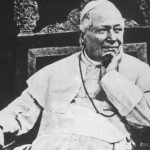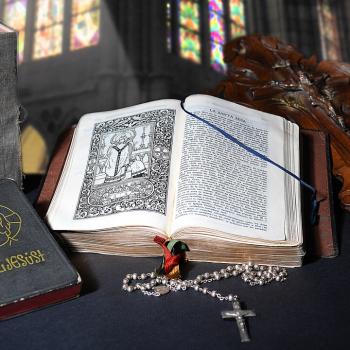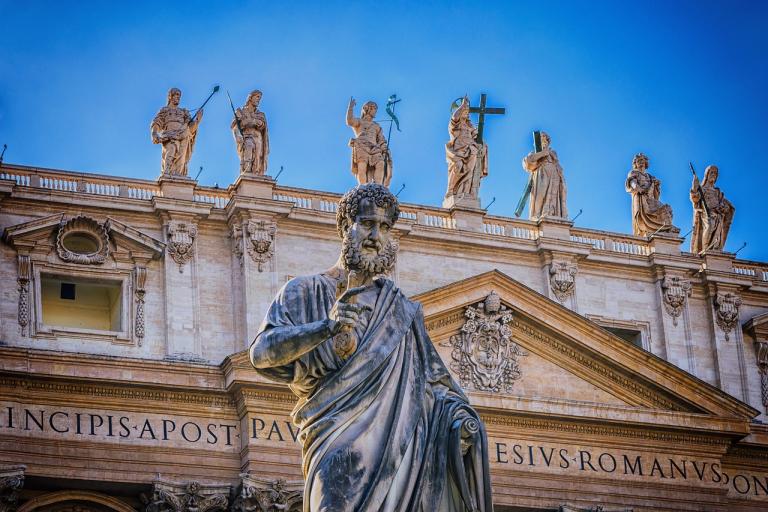
Half the battle, in any discussion with any anti-Catholic, is coming to an agreement on basic facts. If you cannot agree about the things that are true, it’s futile going further. That is where you must begin. Now, I would have thought that the answer to the question in my title was self-evident and long-since settled. Here’s why. Look at how St. Paul opens 1 Corinthians:
Paul, called to be an apostle of Jesus Christ through the will of God, and Sosthenes our brother, unto the church (ἐκκλησίᾳ) of God which is at Corinth …
Wait! let’s stop right there. Paul addresses his letter to the church (ἐκκλησίᾳ) at Corinth. Did you catch that, dear reader? That must mean there was … a church (ἐκκλησίᾳ) at Corinth! The getting of wisdom can be an unpretty thing.
Now, we can forget, for the time being, whether that church was the Catholic church or some other church. We don’t need to dispute that with anyone at this point. The important point is that some church was around, because Paul comes right out and says that that is his audience.
And the other thing to be noted is that there is no book of 1 Corinthians around at the time; for if there were, it would be odd that Paul was writing 1 Corinthians. What’s he doing that for? So there’s a church (ἐκκλησίᾳ), but there’s no completed New Testament.
Apparently, this simple observation is not quite as known, understood, and accepted as I had thought it would be. Google some variation of the words in my title and you’ll find pages of hits addressing the subject. Here, for example, is an excerpt of a dialogue between Fr. Dwight Longenecker and Protestant apologist John Martin on that very question. “Thomas” of Faith and Reason devotes a 2010 blog article (here) to the question. The appropriately-named Mr. Matt Slick, Protestant apologist, attempts to nuance the discussion, here. Mr. John Martignoni, here, has an entire hour-long YouTube video with the same title I do.
Baby steps.
DON’T KNOW MUCH CHRONOLOGY
Now, here’s fairly reliable breakdown of the date when each of the 27 books of the New Testament was written [source]:
Again, we must lay aside any presuppositions we have about which church was the original church. We need not worry whether the Catholic Church wasn’t around until the fourth century. (Some people maintain entire blogs to try to prove this fool idea.) No. Let’s stay on page one here, just for now. And on page one, did you notice that the first book of the New Testament is written around 50 A.D., and the last is written around 95 A.D.—just before the first century ebbed into the second? In other words, the New Testament took forty-five years (nearly half a century) to write. Imagine that!
Where was the church during these forty-five years? Did it not exist until after 95 A.D.? Was there no church to speak of in the first century, existing concurrently with the writing of the New Testament?
Hardly. In fact, if you read the New Testament, you’ll discover that all sorts of references are made to a church that has existed during the period of these forty-five years of composition.
1 Timothy 3:15: “But if I tarry long, that thou mayest know how thou oughtest to behave thyself in the house of God, which is the church (ἐκκλησία) of the living God, the pillar and ground of the truth.”
Acts 2:47: “And the Lord added to the church daily such as should be saved.” [Note: the Greek ἐκκλησία does not appear in this text but is an interpolation of the Protestant KJV for τὸ αὐτό, “their number”; I take up this point further below.]
Acts 9:31: “Then had all the churches (ἐκκλησία) rest throughout Judaea and Galilee and Samaria, and were edified.
1 Timothy 4:14: “Neglect not the gift that is in thee, which was given thee by prophecy, with the laying on of the hands of the presbytery (πρεσβυτερίου).” If there is no church yet, how is it that there is a presbytery? Are we to believe there’s a presbytery but no church for them to be presbyters of?
In fact, we know exactly when the church started, at the latest. (The Catholic teaching is that the Church properly begins on Calvary. The Catechism of the Catholic Church §766, citing both Lumen Gentium and St. Ambrose, says that the Church “was born from the pierced heart of Christ hanging dead on the cross.”) In the written record of St. Luke, Acts Chapter 2, on Pentecost (around the year 33 A.D.), the Holy Ghost descends in “cloven tongues like as of fire,” St. Peter gives a homily and tells “all the house of Israel” to “repent and be baptized,” and “the Lord add[s] to the church daily such as should be saved.”
Now, note, as I said above, that St. Luke does not use the Greek word ἐκκλησία in Acts 2. But he does use it in Acts 5, when Peter rebukes the covetous Ananias and Sapphira. Upon Peter’s rebuke, both fall down dead. Acts 5:11 says, καὶ ἐγένετο φόβος μέγας ἐφ’ ὅλην τὴν ἐκκλησίαν, “And great fear came upon all the church.”
So there is a church that already has existed by the time Peter rebukes Ananias and Sapphira, having been born either at the Cross, or on the Day of Pentecost, in 33 A.D.—seventeen years before the first book of the New Testament was written, and sixty-two years before the last book of the New Testament was finished.
The church exists before the Bible does.
HE DON’T CLAIM TO BE AN A-STUDENT
Now, perhaps you’ll say I’m trivializing all this. No one disputes the chronology. The dispute is over whether the “church” that came before the Bible was the Catholic Church. The dispute is over whether the Catholic Church “gave us” the Bible. Really?
Well, watch what happens when I attempt to have the discussion with the loopy Kevin Failoni in the combox on Out of His Mind. (Out of His Mind is run by one Mr. Timothy F. Kauffman, an ex-Catholic so twisted into a knot of mythology he makes John Bugay look like a marvel of reason and intellectual depth.) Believe it or not, I have edited our exchange for the sake of brevity.
Failoni: God gave us his infallible word, not the church.
[Not sure whether he means that God did not give us the Church or that the Church does not give us the “word.”]
Alt: The idea that “God’s infallible word” just dropped out of the sky somehow, and the church did not precede it, is silly and ahistorical.
Failoni: Really? Or is it silly to believe that the church existed before the Word? Scripture says in the beginning was the Word. Sorry: God’s Word was with Him in the beginning.
Now, what I try to do at this point is clarify whether he is talking about Christ rather than the Bible. If the loopy Mr. F can assure me that he means that Christ, rather than the Bible, was “with God in the beginning,” our exchange can come to an end. But watch what happens.
Alt: Well, yes, that’s true, if by the Word you mean Christ. But you meant the Bible, right? The Bible didn’t exist in the beginning with God. The Church does not precede Christ, but the Church does precede the Bible—at least, the Bible as we have it today, Old Testament plus New Testament.
[Now watch the comical way in which Mr. F avoids the question by swinging, Tarzan-like, into a forest miles away.]
Failoni: Scott, we have different views. A church will never be more important to me than the word of God. Protestants see what happens when [watch the change of terms here:] tradition is elevated over the word of God. Things that you accept from your church [see the change again?] we see as clear idolatry, destruction of the 2 sacraments of God, a false gospel, and all that Rome has piled on the cross through so-called development through tradition. [Head-desk.] Calvin said Jesus was left half-buried in the church. [What was the question I asked, again?] Cyprian and Origen and Jerome contributing mightly. All I know is the ex Catholics on this site looked at the word of God and walked from Rome. The truth will set you free, Scott. I hope you will separate from that system where grace is a tool to merit eternal life and place your trust in the Word.
Did you follow any of that? And why is he constantly switching back and forth between “church” and “tradition,” as though the two words are interchangeable? If they are, that would mean that Christ may as well have said, “On this rock I will build my tradition” (Matt. 16:18). But the Greek word there is ἐκκλησίαν, “church”; not παραδόσεις, “traditions.” Does Mr. F have sufficient knowledge of biblical Greek to be able to tell us that ἐκκλησίαν and παραδόσεις are interchangeable? These are the questions.
But at this point, rather than interrogate him on his faulty Greek translation, I try to recall the poor man to the topic at hand. And note, in bold, my very important qualification.
Alt: I think we can agree that the church preceded the Bible, even if we disagree about which church that is.
Failoni: Saying the church created the Bible is like saying the courts created the constitution. The church is the offspring of God’s word.
So I can only assume at this point that by “God’s word,” the loopy Kevin Failoni does mean the Bible, and not Christ. So what did he mean when he said that “God’s word was with him in the beginning”? That there was a complete copy of the Scriptures, possibly the King James, up in heaven before the words “let there be light” were spoken? I ask him again, very simply this time. And watch how serpentine the exchange gets from this point on. Note that I continually use the word “Bible” to clarify my meaning, whereas Mr. F uses the word “Christ” or “Jesus” in order to deny it. One would be excused for thinking that, in Mr. F’s mind, the word “Christ” is just a synonym for “Bible.”
Alt: So the full Bible existed in 33 A.D.? When Paul wrote to “the church in Corinth,” the Bible was already complete?
Failoni: Jesus is the same Word that spoke the world into existence, long before the church. In the begining was the Word, and the Word as with God, and the Word was God. … God from eternity past spoke the world into existence by his word. And then He spoke to us through His Son, logos, the incarnate Word in who we believe. Now you can believe as the Reformed do the Word existed before the church.
Yeah, but John 1:1 is talking about Christ, not the Bible. John is only talking about the divinity of Christ here [see Matthew Henry]. He’s not talking about the historical origin of Scripture [see John Gill, who opens his discussion of John 1:1 by saying, “this is not said of the written word”].
Alt: I’m simply saying that Christ’s church existed before the Bible was finished and before its canon was determined.
Failoni: 1 Corinthians 4:6: “Now these things, brethren, I have figuratively applied to myself and Apollos for your sakes, so that you may learn to not go beyond what is written. [What does that have to do with anything?] … The courts didnt create the constitution, and the church didn’t create the Word of God. It can only stand under it, receive it, and pass it on. It can’t add its words to it. And that was Rome’s downfall.
Alt: So the Bible just popped into existence in 33 A.D. and anything written after 33 A.D. should not be in the Bible? Or is your argument that Paul’s letters existed before he wrote them?
Failoni: Not sure what your point is.
[You need to be very slow with Mr. F. Start at the beginning, try not to let him wander off, and repeat yourself often. Have lots of smelling salts at hand for when you pass out.]
Alt: My point is that the completed Bible did not pre-exist the New Testament church. The New Testament church began ca. 33 A.D. The last book of the New Testament was written just before 100 A.D. So for the first two generations of the church, there was no Bible as we have it today. There was the Old Testament, and there was an incomplete set of New Testament texts that circulated around, whose canonicity was still to be determined. I’m not making a theological point. I’m making an historical point.
Failoni: Canons aren’t determined, they [just] are. [They just “are”? How does that work exactly?] You’re trying to tell me that the courts made the constitution what it is. No. The prophets didn’t canonize, the apostles never canonized. The canon is God-breathed word. It is. [That explains it. The Bible is just there.] There was a working NT canon long before the church put it in a binder.
[In a “binder”? What, did St. Jerome run off to Staples?]
Alt: You’re leaping 1000 miles beyond my point again. But a canon is a list of books. That’s the definition of the word. There is no such thing as a Bible that “just is.” The Bible came into existence at a particular point in history, and someone had to make a decision about which texts would go in it, and there was a church around for many years before that. These are just historical facts that there is no point in disputing. [Note my concession here in order to alleviate any fear Mr. F might have that accepting the historical point somehow implies popery.] It doesn’t mean you’re Catholic to say that any more than it means you’re Christian to say that there was a person named Jesus who lived at a particular point in history. All it means is you accept history for what it is. The Bible is the end result of a process that occurred in historical time; it didn’t just show up one day.
[Yes. For one thing, it had to be written.]
Failoni: There is a saying in Protestantism, God said it, I believe it, that settles it. Faith comes from hearing God speak His Word of Salvation in His Son. This is not something that bubbles up inside the holy church but as word that comes to us.
Alt: Not talking about the spiritual source of scripture. I am talking about the time in history it was written relative to the time in history the church began. This is a point of chronology.
[Now watch how Tarzan swings off again.]
Failoni: Deut. 4:2 is clear that His word was to have final say in all matters. Jesus dealt harshly with the Magisterium of his day, the Judaizers. [Actually, the Judaizers came later and were rebuked by Paul, but never mind.] You are in a church that has elevated itself and its tradition above the Word of God teaching as doctrines the commandments of men. [Facepalm.] The church is the offspring of the Word of God. Jesus points men to scripture telling them in it is eternal life. Again we don’t say the constitution was given to us by the courts. The church can only receive the gospel and pass it on.
Alt: I am trying to make this easy for you. I am not talking about the authority of scripture. I am talking about when it was written. I am not talking about Judaizers or Pharisees or the Corban Rule or tradition. I am making what I should think is a very simple and limited point. The Church came into existence ca. 33 A.D. The earliest guesses place the writing of the first book of the New Testament around the late 50s A.D. What I am saying—all I am saying—is that 33 A.D. came before 60 A.D. And forget whether that church was the Catholic Church or not. That does not matter to my point. There was a church on earth before there was a completed New Testament on earth. This has nothing to do with anything other than chronology. … If this is not true, then what on earth did Paul mean when he addressed his letter “to the church in Corinth”? If Paul is addressing the church in Corinth, that means that there is a church in Corinth. It also means there’s no book of Corinthians yet, otherwise why is Paul writing it?
[At this point, an interloper arrives.]</p?
Eric W: Why is it so important for Kevin to get the chronology? It is only Providential co-existence of the “church” with the actually written books. The authors of the NT books are necessary to the written books by a “supposition of God’s will.” [EW is trying to make this a dispute over philosophy.] You want to wrench a chronological admission from Kevin to build an argument for church authority. [Actually, I specifically denied that that was my point. Remember?] It doesn’t work with Kevin. Kevin knows that the Bible is authoritative because it’s inspired by the Holy Spirit. The Holy Spirit is free to inspire in any historical context.
Alt: If Reformed theology is true, first-century chronology won’t change that truth. So why deny it? I know that the Bible is authoritative because it was inspired by the Holy Spirit. I’m not denying that. What I am saying, however, is that the Holy Spirit inspired the Bible through the process of history, and that the process occurred within the New Testament church. You don’t have to accept that this church was the Catholic church in order to admit that. You do, however, have to admit that the New Testament does not just show up fully-formed from the Holy Spirit, anterior to the church that Christ founded, as if it were Athena popping out of the head of Zeus.
[Now Mr. F will give the game away and admit his real fear in all this. With a swinging performance by Tarzan again.]
Failoni: Why don’t you just come out and make your argument how you believe the Roman church has the infallible authority to not only interpret scripture but to mitigate salvation for its people through the acts of the church. And while you’re there, describe to us why you think the Roman church can put itself between the Word and the Spirit in bringing salvation to man, and why secondary causes is the decider in the eternal life of a person, instead of the Holy Spirit who the scripture tells us blows where and how He wills. Explain to us how infant baptism through the Priestcraft of ex opere operato produces faith in a baby.
Alt: Kevin, what on earth does the fact that there was a church around for 25 years before the first NT book was written have to do with ex opere operato and the spirit blowing where it wills? This has to do with 33 A.D. coming before 60 A.D. Do you deny the historical record, Kevin? It’s as simple as that. You don’t have to admit to any Catholic doctrine in admitting that 33 A.D. comes before 60 A.D. You only have to admit to the calendar.
Failoni: The canon of scripture is no more a product of the church then the constitution is a product of its courts. Reformed always hold the Word of God precedes scripture and community. It doesn’t say in the beginning was the community, it says in the beginning is the Word.
[Once again, Mr. F has tried to confuse the issue by pulling out John 1:1, which has to do with the deity of Christ, not the origin of the New Testament in history. That is the exegesis we read in Reformed theologian John Gill. Does Mr. F have learning that would supersede Gill in Reformed thinking?]
Alt: Kevin, you have this backward. You can’t use constitution and courts as an analogy for the simple fact that the Constitution was completed before the first court came into session. It is the exact opposite with the Bible and the church. The church came into existence on Pentecost ca. 33 AD. The first book of the NT would not be written for at least another 25 years.
Failoni: Covenant is canon. Get that? [No. It’s pseudo-academic gobbledygook.] … The Word of God precedes all, and the plan of redemption through the covenant of grace [is] inscripturated in the canon. … That’s why we say the church is the offspring of the Word of God. So can you please make your broader point?
Alt: I think you’re trying to read more into what I said than is there. I said that the church exists before the New Testament exists. I didn’t say that the church has authority over God’s word; I said that there is a church before there is a New Testament. I didn’t say the New Testament is not covenantal; I said there is a church before there is a New Testament. I didn’t say the New Testament was a product of human doings; I said there is a church before there is a New Testament. I didn’t say that somehow the canon is still open; I said there is a church before there is a New Testament. This is not complicated. I agree that “the church is the offspring of the Word of God,” if by “Word of God” you mean Christ. But if by “Word of God” you mean a completed Bible, Old Testament and New, with its canon determined, no, the church comes first. That doesn’t mean that the church has authority over the Bible. It means that if you were Doc Brown and set your DeLorean to arrive in the Holy Land on October 1, 40 A.D, you would find a church, you would find apostles, you would find Christians, but you would not find a single book of the New Testament anywhere, simply because it had not been written yet.
Failoni: And your point is? At some point you’re going to have to make your point.
Alt: Kevin, I’ve made my point over and over and over again. The point is this: The church existed on earth before the New Testament existed on earth. My point begins and ends there.
Failoni: I have told you the Reformed position from the beginning that the Word of God preceded the church. But you continue to assert the church came first.
Alt: We must define our terms. By “word of God” do you mean Christ or the Bible? Because if you mean “Christ,” then you are right. If you mean “Bible,” then you are wrong, and not only wrong, but culpably and ignorantly wrong.
Well, the conversation continued for a little while after all that, but no more fruitfully. Mr. F never did admit that there’s a church before there’s a Bible. That small thing was just too threatening a point for him to grant.
DON’T KNOW MUCH CHURCH HISTORY
But that is what most conversations are like with the loopy Mr. Kevin Failoni. And that is why most conversations in comboxes are baneful and why I mostly avoid them. But the marvel to me in all of the above is this: that a discussion about whether or not the Bible came before or after the church in historical time proceeded as though it were a discussion of whether the church gives us the Bible out of an authority inherent in itself. Layered over that was a constant wandering back and forth of the terms “Bible,” “Word of God,” and “Christ,” as though all these things were coterminous. This is exactly why I say that one must, as a first principle of apologetics, get one’s facts right and terms right. You can’t talk of “the Bible,” “the Word of God,” and “Christ” as though the words are all interchangeable. You can’t treat a discussion of dating the Bible and the church in historical time as though it were a discussion of church authority relative to Scriptural authority. Those are two separate conversations.
Even the limited claim, however—the church comes first in historical time—Mr. F had to deny and run from: as though, once concede it, he might as well concede the subsequent discussion about church authority; as though the chronological claim, of itself, were a crucifix to a vampire.
But lurking behind the resistence is a fundamental misunderstanding of what the Bible is, and how we get the Bible. No one disputes that the Bible is the Word of God and that it is inspired by the Holy Spirit. But it does not just drop out of the sky, fully formed, on Pentecost. The Scriptures are not just there; canon is not something, as Mr. F puts it, that “just is.” Rather, the Holy Spirit works through history, through men, and—this is key—through the Church. That is what Mr. F was resisting; and a simple history lesson exposes it.
God gives us the nation of Israel first, and only through it the Old Testament; God gives us the Church first, and only through it the New Testament. The Word of God operated, prior to Scripture, through the nation of Israel and through the Church. The canon does not get finished for two generations after Pentecost. After that, someone had to decide what went into the canon; the Holy Spirit had to inspire someone to get the list right. Why Romans and not the Protoevangelium of James? Why Galatians and not the Epistle to the Laodiceans? There is a church first, then 27 books take 67 years to write, then someone chooses those particular books, before we can speak of “the Bible.”
You must begin here. It is important to get this right. Even if it means—especially if it means—that you need to start by pointing out that there was a church for almost a quarter century before a single book of the New Testament was even written.
Catholicism, and its specific teaching about the nature of Church authority, are not clinched in this way. But a lingering Protestant misunderstanding of what the Bible and the canon are is destroyed by it.
***
If you like the content on this blog, your generous gift to the author helps to keep it active. I remember all my supporters in my Mass intentions each week.












